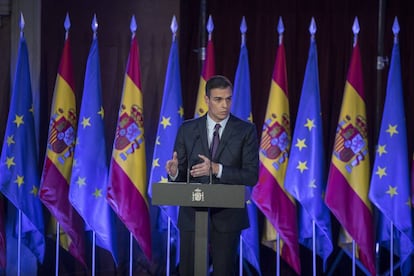Ahead of EU summit, Spanish PM asks UK for a clear plan on Brexit
Pedro Sánchez is travelling to Brussels for a meeting that could delay Britain’s departure from the EU

Spanish Prime Minister Pedro Sánchez on Tuesday asked the United Kingdom to stop “going around in circles,” and to clarify whether and why it wants to delay its exit from the European Union.
“We know what they don’t want, but not what they want,” said Sánchez at a talk about the future of Europe at Madrid’s Ateneo center, where he took a break from the national issues monopolizing the political agenda ahead of the snap general election of April 28.
We know what they don’t want, but not what they want
Spanish PM Pedro Sánchez
The Socialist Party (PSOE) leader has cancelled many of his international engagements to focus on the campaign race. Spain will also be holding local, regional and European elections on May 26.
In his nine months in power, Sánchez has emerged as Spain’s most internationally oriented leader, and he has set a record for travel by a Spanish head of government.
This week, Sánchez will not be missing out on his global appointments. There is an important European Council summit in Brussels on Thursday and Friday where Brexit will be discussed, although at this point the Spanish government is unclear about the position that British PM Theresa May will bring to the table. There is a chance that she will ask for an extension to the March 30 deadline to withdraw from the EU, but Sánchez and other European leaders are worried about the absence of a clearly defined strategy.
A social Europe is the force that will relegitimize the European project from the bottom up
Spanish PM Pedro Sánchez
Speaking at the Ateneo, a historical building in Madrid that was once a hub of political culture, particularly during the Second Republic in the 1930s, Sánchez delivered a speech against Brexit, populism and politicians who play with feelings.
He said that there is only one way left to fight “the enemies of Europe, those who want to destroy it,” and that is to go back to the social origins of the European Union. “A social Europe is the force that will relegitimize the European project from the bottom up.”
Regarding Brexit, he described the referendum as “a completely erroneous mechanism to solve complex dilemmas,” and said that what was being asked of voters was “an emotional yes; a feeling, rather than a vote. Now the British are finding out that, by voting themselves out, they voted for less wealth, more seclusion, less influence and a greater loss of real and tangible benefits.”
The cost to Spain
A disorderly no-deal Brexit could cost the Spanish economy more than €9 billion over the course of the next five years, or 0.82% of GDP, according to Bank of Spain calculations based on the Bank of England's own 2018 projections. An orderly no-deal withdrawal would bring the cost down to approximately €6 billion, or 0.5% of GDP. This second scenario supposes that contingency plans will work and that both sides will strive to keep problems down to a minimum.
On the other hand, a Brexit that came with a deal would have a very small impact on the Spanish economy, in the range of €200 million or 0.02% of GDP, since a stronger pound would compensate many of the losses, according to a Bank of Spain report released on Tuesday. Most of these losses are attributable to the change in trade relations.
The Spanish government has not made any public forecast about the cost of Brexit. The German executive, by contrast, has estimated that its own economy could lose up to two percentage points of GDP.
English version by Susana Urra.
Tu suscripción se está usando en otro dispositivo
¿Quieres añadir otro usuario a tu suscripción?
Si continúas leyendo en este dispositivo, no se podrá leer en el otro.
FlechaTu suscripción se está usando en otro dispositivo y solo puedes acceder a EL PAÍS desde un dispositivo a la vez.
Si quieres compartir tu cuenta, cambia tu suscripción a la modalidad Premium, así podrás añadir otro usuario. Cada uno accederá con su propia cuenta de email, lo que os permitirá personalizar vuestra experiencia en EL PAÍS.
¿Tienes una suscripción de empresa? Accede aquí para contratar más cuentas.
En el caso de no saber quién está usando tu cuenta, te recomendamos cambiar tu contraseña aquí.
Si decides continuar compartiendo tu cuenta, este mensaje se mostrará en tu dispositivo y en el de la otra persona que está usando tu cuenta de forma indefinida, afectando a tu experiencia de lectura. Puedes consultar aquí los términos y condiciones de la suscripción digital.









































